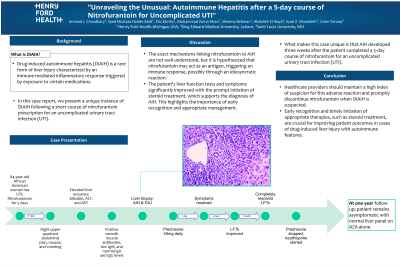Sunday Poster Session
Category: Liver
P1118 - Unraveling the Unusual: Autoimmune Hepatitis After a 5-day Course of Nitrofurantoin for Uncomplicated UTI
Sunday, October 22, 2023
3:30 PM - 7:00 PM PT
Location: Exhibit Hall

Has Audio

Syed Murtaza Haider Zaidi, MD
King Edward Medical University
Lahore, Punjab, Pakistan
Presenting Author(s)
Ammad Chaudhary, MD1, Eric Denha, MD1, Muhammad Zarrar Khan, MD1, Sheema Rehman, DO1, Syed Murtaza Haider Zaidi, MD2, Abdallah El Alayli, MD3, Eyad Z. Gharaibeh, MD3, Umer Farooq, MD4
1Henry Ford Hospital, Detroit, MI; 2King Edward Medical University, Lahore, Punjab, Pakistan; 3Saint Louis University, St. Louis, MO; 4Rochester General Hospital, Rochester, NY
Introduction: Drug-induced autoimmune hepatitis (DIAIH) is a rare form of liver injury characterized by an immune-mediated inflammatory response triggered by exposure to certain medications. In this case report, we present a unique instance of DIAIH following a short course of nitrofurantoin prescription for an uncomplicated urinary tract infection (UTI). Understanding the association between nitrofurantoin and DIAIH is crucial to improve early recognition and appropriate management of this condition.
Case Description/Methods: 84-year-old African American woman with a history of type 2 diabetes mellitus presented with postprandial right upper quadrant sharp shooting abdominal pain with associated nausea and vomiting. She reported taking nitrofurantoin 100 mg tablets twice daily for five days for a recent UTI. Denied taking herbal remedies or unprescribed supplements. Never smoked or drank excessive alcohol. Initial blood tests revealed elevated liver biochemistry with bilirubin 7.6 mg/dL, alanine transaminase 343 IU/L, aspartate aminotransferase 261 IU/L, and alkaline phosphatase 135 U/L. Immunological tests revealed positive smooth muscle antibodies with a titer of 95 units: normal IgA and IgG levels, and low IgM. Double-stranded DNA antibodies, anti-mitochondrial antibodies, and anti-microsomal antibodies were not detected. Other labs and imaging were within normal limits. A liver biopsy was performed, which showed acute hepatitis with moderate necroinflammatory activity consistent with AIH and drug-induced liver injury (DILI).
Discussion: The association between chronic nitrofurantoin use and AIH is relatively well-recognized. However, in this case, the temporal relationship between nitrofurantoin exposure and AIH development challenges the conventional understanding of nitrofurantoin-related hepatotoxicity. The underlying mechanisms linking nitrofurantoin to AIH remain unclear, but it is hypothesized that nitrofurantoin may act as an antigen triggering an immune response, potentially through an idiosyncratic reaction. The unique aspect of this case is the temporal association between nitrofurantoin exposure and AIH development as the patient developed AIH three weeks after a 5-day course of nitrofurantoin for an uncomplicated UTI. Prompt initiation of steroid treatment resulted in significant improvement in liver function tests and symptoms, supporting the diagnosis of AIH. Early recognition and appropriate management, such as initiation of steroid therapy, are crucial in improving patient outcomes.
Disclosures:
Ammad Chaudhary, MD1, Eric Denha, MD1, Muhammad Zarrar Khan, MD1, Sheema Rehman, DO1, Syed Murtaza Haider Zaidi, MD2, Abdallah El Alayli, MD3, Eyad Z. Gharaibeh, MD3, Umer Farooq, MD4. P1118 - Unraveling the Unusual: Autoimmune Hepatitis After a 5-day Course of Nitrofurantoin for Uncomplicated UTI, ACG 2023 Annual Scientific Meeting Abstracts. Vancouver, BC, Canada: American College of Gastroenterology.
1Henry Ford Hospital, Detroit, MI; 2King Edward Medical University, Lahore, Punjab, Pakistan; 3Saint Louis University, St. Louis, MO; 4Rochester General Hospital, Rochester, NY
Introduction: Drug-induced autoimmune hepatitis (DIAIH) is a rare form of liver injury characterized by an immune-mediated inflammatory response triggered by exposure to certain medications. In this case report, we present a unique instance of DIAIH following a short course of nitrofurantoin prescription for an uncomplicated urinary tract infection (UTI). Understanding the association between nitrofurantoin and DIAIH is crucial to improve early recognition and appropriate management of this condition.
Case Description/Methods: 84-year-old African American woman with a history of type 2 diabetes mellitus presented with postprandial right upper quadrant sharp shooting abdominal pain with associated nausea and vomiting. She reported taking nitrofurantoin 100 mg tablets twice daily for five days for a recent UTI. Denied taking herbal remedies or unprescribed supplements. Never smoked or drank excessive alcohol. Initial blood tests revealed elevated liver biochemistry with bilirubin 7.6 mg/dL, alanine transaminase 343 IU/L, aspartate aminotransferase 261 IU/L, and alkaline phosphatase 135 U/L. Immunological tests revealed positive smooth muscle antibodies with a titer of 95 units: normal IgA and IgG levels, and low IgM. Double-stranded DNA antibodies, anti-mitochondrial antibodies, and anti-microsomal antibodies were not detected. Other labs and imaging were within normal limits. A liver biopsy was performed, which showed acute hepatitis with moderate necroinflammatory activity consistent with AIH and drug-induced liver injury (DILI).
Discussion: The association between chronic nitrofurantoin use and AIH is relatively well-recognized. However, in this case, the temporal relationship between nitrofurantoin exposure and AIH development challenges the conventional understanding of nitrofurantoin-related hepatotoxicity. The underlying mechanisms linking nitrofurantoin to AIH remain unclear, but it is hypothesized that nitrofurantoin may act as an antigen triggering an immune response, potentially through an idiosyncratic reaction. The unique aspect of this case is the temporal association between nitrofurantoin exposure and AIH development as the patient developed AIH three weeks after a 5-day course of nitrofurantoin for an uncomplicated UTI. Prompt initiation of steroid treatment resulted in significant improvement in liver function tests and symptoms, supporting the diagnosis of AIH. Early recognition and appropriate management, such as initiation of steroid therapy, are crucial in improving patient outcomes.
Disclosures:
Ammad Chaudhary indicated no relevant financial relationships.
Eric Denha indicated no relevant financial relationships.
Muhammad Zarrar Khan indicated no relevant financial relationships.
Sheema Rehman indicated no relevant financial relationships.
Syed Murtaza Haider Zaidi indicated no relevant financial relationships.
Abdallah El Alayli indicated no relevant financial relationships.
Eyad Gharaibeh indicated no relevant financial relationships.
Umer Farooq indicated no relevant financial relationships.
Ammad Chaudhary, MD1, Eric Denha, MD1, Muhammad Zarrar Khan, MD1, Sheema Rehman, DO1, Syed Murtaza Haider Zaidi, MD2, Abdallah El Alayli, MD3, Eyad Z. Gharaibeh, MD3, Umer Farooq, MD4. P1118 - Unraveling the Unusual: Autoimmune Hepatitis After a 5-day Course of Nitrofurantoin for Uncomplicated UTI, ACG 2023 Annual Scientific Meeting Abstracts. Vancouver, BC, Canada: American College of Gastroenterology.
